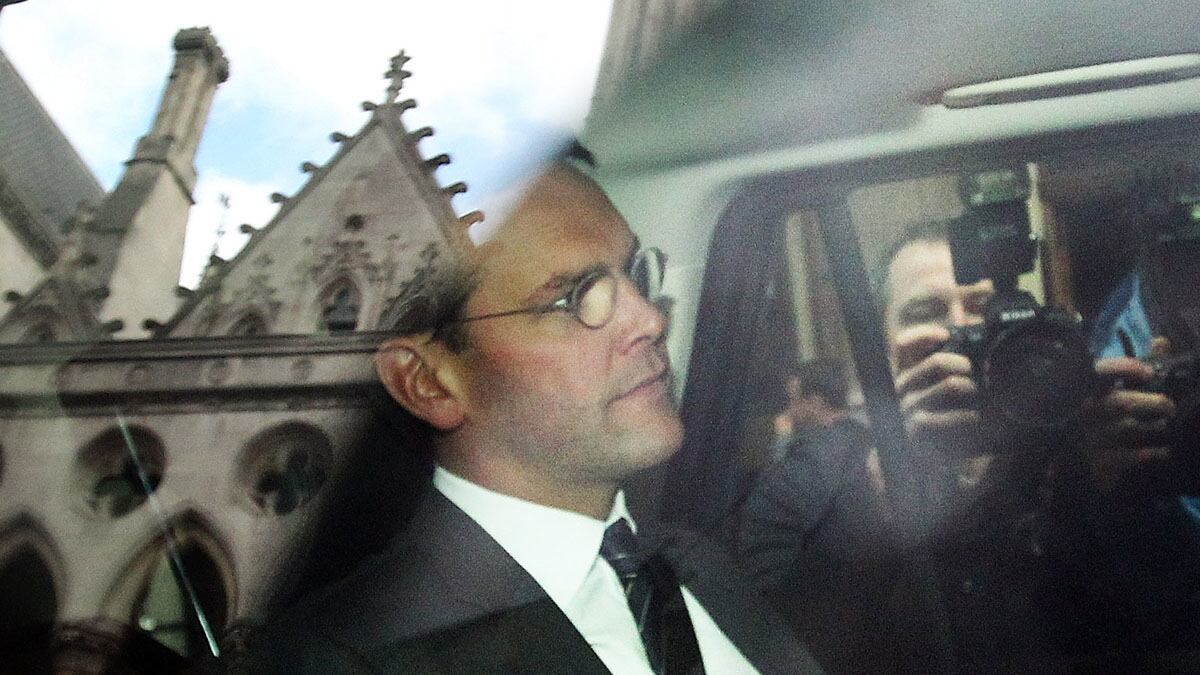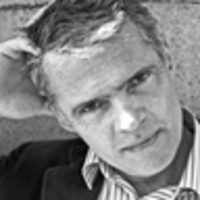A defiant James Murdoch took the stand at the Leveson Inquiry today for a much-anticipated grilling on his role in the phone-hacking scandal roiling his former turf. The former CEO of News International—the U.K. arm of his father’s News Corp. conglomerate—hadn’t made an appearance in London since resigning from the post in February. But he arrived more than an hour early to the courthouse, which was packed with spectators and an expectant air.

So far, though, viewers have seen more of the same from the younger Murdoch, who has stuck hard to the defense that he has maintained throughout the crisis—that he wasn’t aware of the extent of the phone-hacking problem until recently, and hadn’t knowingly acted to help cover it up. His careful management-speak was so persistent at times that onlookers laughed.
An increasingly exasperated Robert Jay, QC—the inquiry’s lead counsel—got right to the point: questioning Murdoch on what he knew about the phone-hacking problem at News of the World when he authorized an unprecedented settlement to a hacking victim in 2008. The suit had unearthed the infamous “for Neville” email that suggested hacking was widespread at the tabloid, not confined to a “rogue reporter,” as News International had long maintained. But Murdoch told Parliament last summer that he didn’t know the full scale of the problem at the time.
Former News Corp. executives have since contradicted that assertion, insisting that they briefed Murdoch in the lead-up to the settlement. It has also been revealed that Murdoch responded to a chain of emails—later deleted from his account by an IT worker—that contained details of the extent of the problem. Murdoch has responded by claiming he didn’t read the full email chain.
He reiterated that claim in his testimony today, and stressed that company executives had in fact worked to keep him out of the loop. “That is something I have struggled with,” he said. “Why wouldn't they tell me? They didn't.”
Jay ran Murdoch through accounts of meetings that seemed to suggest otherwise, and he proposed that Murdoch approved the high settlement because he knew that new evidence had come to light and hoped to keep it from becoming public. But Murdoch denied this was the case.
“There are two possibilities here,” Jay finally said. “Either you were told of the evidence that linked others at the News of the World to [private detective Glenn] Mulcaire and this was in effect a cover-up, or you weren't told, and you didn't read the emails properly, and there was failure of governance at the company. Do you accept that?”
Murdoch didn’t agree.
The inquiry then moved on from phone hacking and to the company’s relationship with politicians and bid for the broadcaster BSkyB.
In his witness statement to the inquiry, published today, Murdoch detailed his meetings with Prime Minister David Cameron—including one at a Christmas dinner hosted by Rebekah Brooks at 2010 in which he admits the controversial BSkyB bid was discussed.
Later-morning testimony by James focused heavily on the meetings with senior conservatives in the runup to the general election in 2010, when News International shifted its support away from the incumbent Labour Prime Minister Gordon Brown to his challenger David Cameron. He confirmed a legendary account of a slanging match with The Independent editor, Simon Kelner, whose paper had run billboards criticizing Rupert Murdoch. James admitted he did use "colorful language" and was disappointed that Kelner had attacked his father when he had "availed himself of my family's hospitality" (Kelner quickly denied this on Twitter: "Have never once been to a Murdoch summer or Christmas party. Unlike most of the political or media establishment.")
But the main focus of the question was around the various meetings between James and senior politicians in the runup to the massive BSkyB bid, which had to be threaded through the competition and plurality laws in the U.K. Interestingly, James suggested Rebekah Brooks had mainly led this, and she consulted with his father on a “regular frequency”—this could lead to some interesting areas for discussion when Rupert takes the stand tomorrow. However, James did disclose he had discussed the bid with David Cameron over Christmas and the Chancellor of the Exchequer George Osborne who was a “friend.” Though James maintained he always “spoke directly” and nothing he said to them was any different to his public statements on the takeover, this could still prove uncomfortable for senior government figures who were supposed to keep a “quasi judicial role” in regard to the $12 billion bid.
In a surprising development toward the end of the morning's questioning, Jay revealed that 163 pages of emails had been sent to him, detailing conversations between senior News Corp. lobbyist Frederic Michel and an adviser to the culture minister, Jeremy Hunt. When the counsel for the inquiry suggested James was lobbying hard, the former chair of BSkyB and News International showed a rare flash of temper: "I don't work that way!" before the session broke for lunch.
Murdoch’s appearance turned more explosive as the afternoon wore on, with Jay turning his focus to a massive email dump, provided to the inquiry by Rupert Murdoch, which could spell deep trouble for Culture Minister Hunt, who was charged with oversight of News Corp.'s BSkyB bid. The snippets shown from the 163 emails between Hunt's special adviser and News Corp. lobbyist Michel drew the occasional gasp from the usually restrained lawyers crowding court 73. They appeared to show that News Corp. had what the British press is calling a “back channel” into Hunt’s office.
In one email Michel says he managed to get inside information about an upcoming Parliament announcement from Hunt on the deal, adding that it was “absolutely illegal.”
In another he suggests that News Corp. and the government have agreed to a plan in pushing the bid that will spell “game over for the opposition."
And in another, which has drawn mockery far and wide on Twitter, Michel brags that he managed to catch Hunt for a call just before Hunt went to the theater with his special adviser for a production of Swan Lake.
Hunt's role was supposed to be a quasi-judicial one, as he was legally charged to make sure the purchase of the remaining 61 percent of Britain's biggest broadcaster by revenues would not infringe competition law or the plurality test. Since News Corp. already dominates the British press, with 40 percent of the readership, this test was always going to be a tough hurdle. However, all the indications were that, in the days before the phone-hacking scandal at News of the World erupted last summer, he was days away from approving the bid.
To many, such as the Labour M.P. Tom Watson, the exchanges in court suggest that Hunt was in breach of the ministerial code and gave special access to News Corp. As he tweeted: “I've been on this inquiry for three years, and still I am shocked. The web of connections between gov and NI is incredible.” If the emails released today substantiate these claims, Hunt's career could be in jeopardy. Already, betting organizations have closed their books to further bets on his ministerial survival, though other reports claim Hunt is not even thinking of resignation and looks forward to giving his own testimony to Leveson.
In one of the last exchanges of the day, Jay tried to pin the former chair of News International and BSkyB down on the corporate lobbying tactics. “You do not appear to be evincing much if any surprise about what we see in this exhibit [the emails],” Jay observed, and suggested that is because News International papers supported the Conservative Party before the election, “you would expect the government to respond favorably to a bid by News Corp.” Jay continued, “You are quite blind to what would appear to the rest of us to be obvious about quid pro quo support.”
“There is absolutely not a quid pro quo for support,” Murdoch replied. “I simply wouldn’t make that trade. It would be inappropriate to do so. And I just don’t do business that way."
Jeremy Hunt's opposite number in Parliament, Labour shadow Culture Minister Harriet Harman, has just asked Hunt to come to answer questions in the House of Commons and tender his resignation.
Testimony will continue tomorrow and Wednesday with Rupert Murdoch, chair and CEO of News. Corp., taking the stand.







